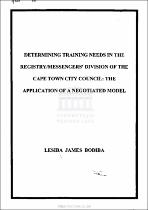| dc.description.abstract | This study is about the application of a negotiated model of training needs analysis in the Registry/Messengers" Division of the Cape Town City Council. The negotiated model of training needs analysis is predicated on the formation of the performance evaluation committees.
These committees comprise the assessees, the line managers, the peers and the trainers. Their primary responsibility is to address issues of performance ratings, causes of performance discrepancies, training solutions and/or non-training solutions in the key performance areas of
individual employees who belong to the various job families. The study argues that the current application of the traditional model of training needs analysis in the RegistryfMessengers' Division which is both "menu-driven" and "line management-driven", is not scientific and
participatory in form and nature. The study has four objectives. The first was to give some background to the RegistryfMessengers' Division. This painted a picture of the organisation, management and functions of the RegistryfMessengers' Division. The second objective was to
provide a conceptual framework of the study by examining the existing literature on the contending models of training needs analyses, namely, the traditional model of training needs analysis and the negotiated model of training needs analysis, in public organisations. The third objective was to adopt and apply the negotiated model of training needs analysis in the RegistryfMessengers' Division. The fourth objective was to recommend the institutionalisation of the negotiated model of training needs analysis in the RegistryfMessengers' Division in “particular and the Cape Town City Council in general- given the fact that its strengths far outweigh its weaknesses. The study concludes inter alia, that th~ current application of the traditional model of training needs analysis in the Registry/ Messengers' Division should be replaced by the negotiated model of training needs analysis considering the fact that the latter allowed the collective and scientific determination of the training needs of the employees. The study then recommends the adoption of the negotiated model of training needs analysis in the Registry/ Messengers' Division in particular and the Cape Town City Council in general. However, the following
factors and issues need to be taken into account to ensure the effective implementation of the negotiated model of training needs analysis in the organization, for example, educating the employees about the new approach to training needs analysis; identification of key performance areas; conducting an organization wide training needs analysis; development of performance standards for the key performance areas; formation of performance evaluation committees in the various job families; and agreement upon the performance rating scale | en_US |

